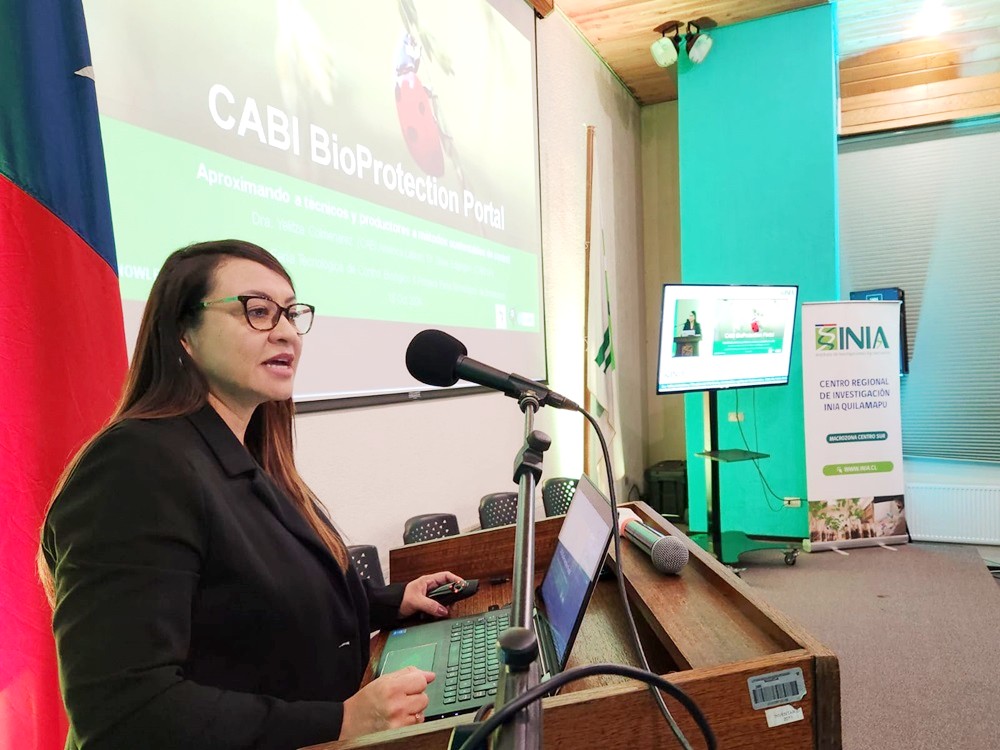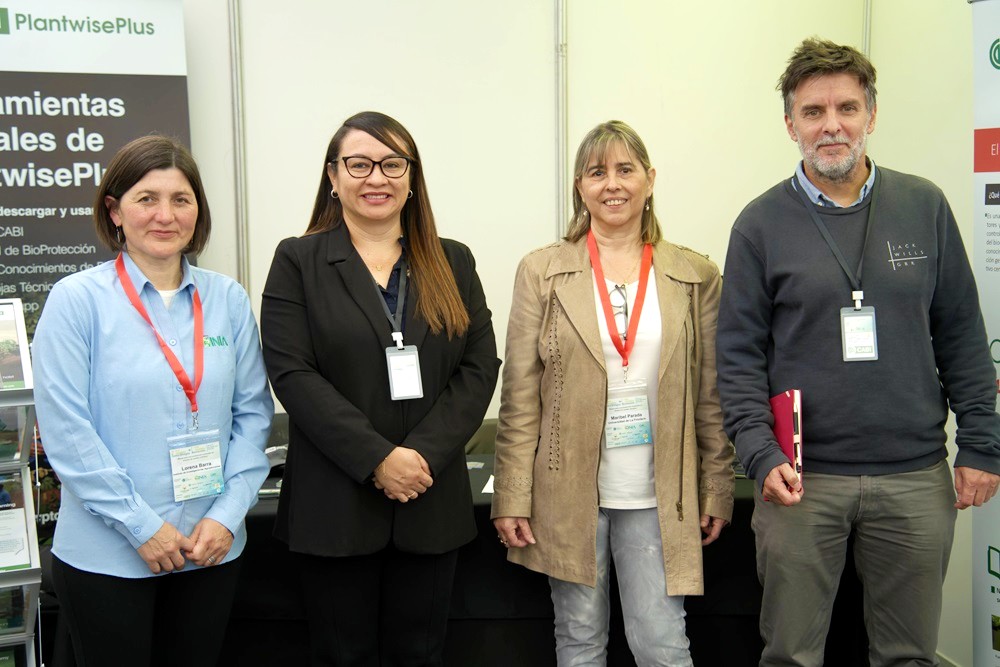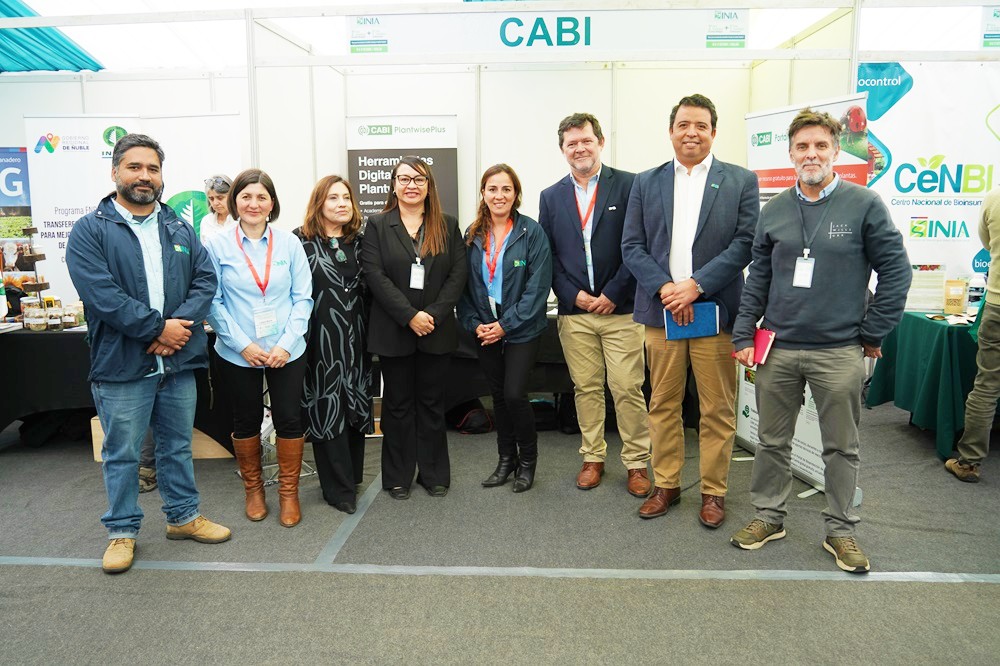
The CABI BioProtection Portal – the world’s largest free resource for biological plant protection – has been highlighted at the Second Technological Fair on Biological Control and the First Technological Fair on Bioinputs in Chile.
The event attracted over 400 participants, highlighting the increasing demand for information on biocontrol as part of sustainable agriculture practices. They included 74 industry professionals and representatives from eight sponsoring organizations, reflecting strong private-sector commitment to sustainability and innovation.
The Fair’s collaborative spirit was further reinforced by three satellite events and the involvement of five partner organizations, including CABI. These activities fostered valuable knowledge exchange, strengthening regional efforts to promote eco-friendly agricultural practices.
Eco-friendly pest control strategies
Scientists from CABI, including Dr Yelitiza Colmenarez, Centre Director, Brazil, and Dr Steve Edgington, Biopesticides Team Leader, were on hand to talk about the benefits of the CABI BioProtection Portal at the event organized by INIA-Chile.
As sustainable agriculture gains momentum across Latin America, innovative solutions are empowering farmers to adopt eco-friendly pest control strategies.
One of these is the CABI BioProtection Portal – a powerful tool designed to help farmers, agronomists, and agricultural professionals identify effective biological control solutions for pest management.
Biological control in the context of sustainable production
Dr Colmenarez delivered a presentation about the importance of biological control in the context of sustainable production and the use of information platforms such as the CABI Bioprotection portal for the uptake of biological control at the field level.
It was a dynamic session with the active participation of the attendees, who provided good suggestions to disseminate this important tool even more among the Chilean technicians and farmer´s community.
This presentation opened the discussion about this topic followed by the practical session and invitation to visit the CABI Bioprotection Portal stand.
Dr Colmenarez said, “The CABI BioProtection Portal is transforming how agricultural communities access vital biocontrol resources, making sustainable farming a reality for all.
“This comprehensive resource offers an extensive database of biocontrol products registered across multiple countries and continents, along with practical guidance for sustainable crop protection.
“The portal is designed to empower users with reliable, up-to-date information, enabling farmers and agricultural professionals to make informed decisions. By reducing dependency on chemical pesticides, the portal supports environmentally friendly pest and disease control options.”
Contribute to the development of public policies

During the event, the president of the Chilean Network of BioInputs, Dr Maribel Paradas Ibanez, presented the work done by this important national initiative, connecting stakeholders linked to bioinputs in Chile, to educate, promote use, and contribute to the development of public policies.
The use of Biological Control is increasing in Latin American countries, but it´s important that technicians and farmers get an easy access to the information of what bioproducts are available in their countries.
The CABI BioProtection Portal is the largest, free global resource for biological pest management. Its mission is to raise awareness and encourage the adoption of bioprotection among growers and advisors.
It offers a comprehensive, searchable directory of nationally registered biocontrol and biopesticide crop protection products, along with detailed guidance to help agricultural advisors and growers source and effectively incorporate these sustainable natural products into integrated pest management programmes.
Data and information are available in multiple local languages and English, and is accessible online and offline across smartphones, tablets, and desktops.
Establishment of partnerships at the global, regional, and national level
The establishment of partnerships at the global, regional, and national level is very important to keep reinforcing the use and improvement of the CABI BioProtection Portal. CABI is delighted to welcome the Chilean Network of BioInputs as strategic partners joining efforts as an Associated Member of the CABI BioProtection Portal.
The Chilean Bioinputs Network is a collaborative network of more than 200 members, including researchers, universities, companies, government entities, and farmers.
The organization plays a key role in advancing the adoption of bioinputs by fostering connections between stakeholders, promoting education, and contributing to the development of public policies in Chile.

Additional information
Main image: Dr Yelitza Colmenarez speaking at the Fair in Chile.
Relevant stories
‘Red Chilena de Bioinsumos joins the CABI BioProtection Portal as an Associate.’
‘Find bioprotection products faster and easier with new CABI BioProtection Portal.’
Related News & Blogs
Expertise in biological control highlighted at workshop aimed at catalysing biopesticide use in Africa
CABI scientists have highlighted their expertise in biological control agents to sustainably fight crop pests and diseases at a workshop aimed at catalysing the development of the biopesticides industry and building regional harmonization to help ensur…
12 March 2024
